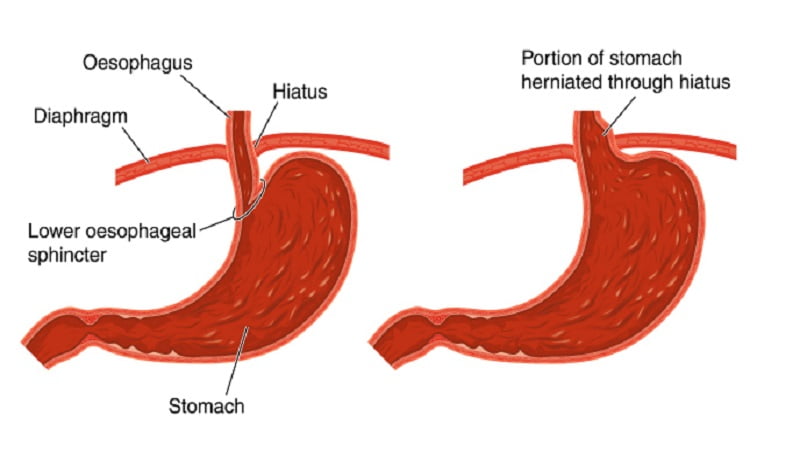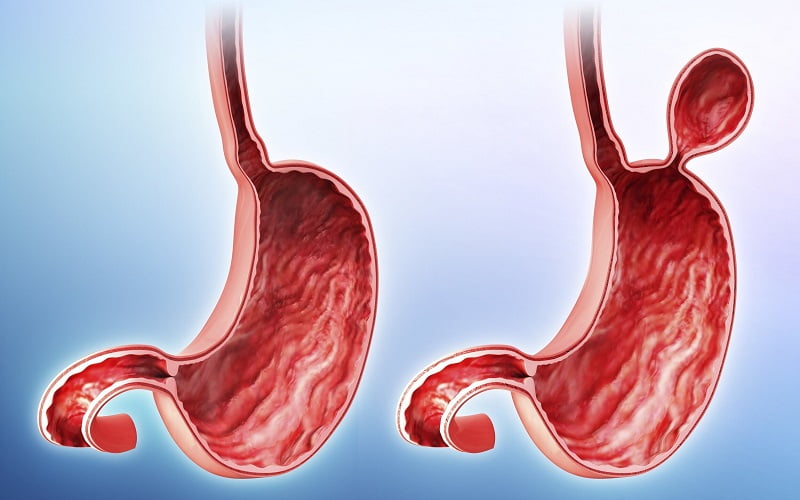Hiatus Hernia
Treatments
Hiatus Hernia
A hiatus hernia, also known as a hiatal hernia, occurs when part of the stomach protrudes through the diaphragm into the chest cavity. The diaphragm is the muscle that separates the chest cavity from the abdomen. Hiatus hernias are common and can occur in people of all ages, although they are more common in older adults.
Types of Hiatus Hernia
Sliding Hiatus Hernia:
This is the most common type, where the junction of the esophagus and stomach, known as the gastroesophageal junction, and a portion of the stomach slide up into the chest through the hiatus (an opening in the diaphragm).
Paraesophageal Hiatus Hernia
In this less common type, a portion of the stomach squeezes through the hiatus and lies alongside the esophagus. This type of hernia can lead to complications such as gastric strangulation or obstruction.
Symptoms

Heartburn
A burning sensation in the chest, often after eating or when lying down.

Regurgitation
Acid reflux or the sensation of food coming back up into the throat.

Chest pain
Discomfort or pain in the chest, which can sometimes mimic heart-related conditions.

Belching
Frequent belching, especially after eating or drinking.

Difficulty swallowing
Especially with larger pieces of food.
Diagnosis
Barium swallow:
A special X-ray test where you swallow a barium solution, allowing doctors to see the esophagus and stomach more clearly.
Endoscopy:
A flexible tube with a camera is inserted into the esophagus to visually inspect it. This can help confirm the presence of a hiatal hernia and evaluate the severity of any associated inflammation or damage to the esophagus.
Esophageal manometry:
Measures the pressure inside the esophagus and the coordination of muscle contractions.
Treatment

Lifestyle changes
Making certain changes to your lifestyle and eating habits can help reduce symptoms of hiatus hernia, such as avoiding large meals, spicy foods, caffeine, alcohol, and acidic foods.

Medications
Over-the-counter or prescription medications such as antacids, proton pump inhibitors (PPIs), or H2 receptor blockers can help reduce acid production and alleviate symptoms like heartburn and reflux.

Surgery
In severe cases or when conservative treatments fail to provide relief, surgery may be recommended to repair the hernia and prevent complications. Surgical options include laparoscopic or open repair of the hiatus hernia, often combined with a procedure to reinforce the lower esophageal sphincter to prevent reflux

Elevating the head of the bed
Sleeping with the head of the bed elevated can help prevent reflux during the night.

Weight management
Losing excess weight can help reduce pressure on the abdomen and decrease the severity of symptoms.
Complications
Esophagitis
Inflammation of the esophagus due to acid reflux.
Stricture
Narrowing of the esophagus due to scarring from chronic inflammation.
Barrett's esophagus
A condition where the lining of the esophagus changes, increasing the risk of esophageal cancer.



